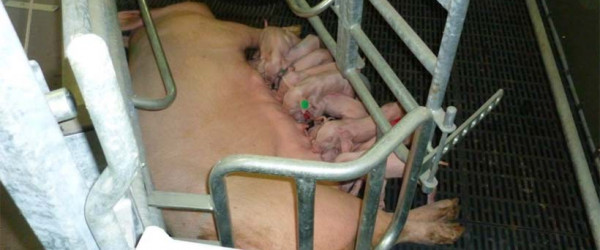
NZ Pork at risk of repeating mistakes of big egg business
October 26th, 2018The social licence for factory farming is on a sharp decline. All major supermarket chains in New Zealand now have a policy to move away from selling cage eggs, while sales of free-range meat and eggs are booming.
The Minister of Agriculture, Damien O’Connor, recently warned farmers that the “lowest common denominator” will reflect the whole industry. “The bad practice of any one farmer on the welfare of animals or the environment can be around the world in the blink of an eye.”
People calling for an end to cages for confining hens or pigs are no longer dismissed as extremists. Today, you’re more likely to be considered ‘extreme’ for supporting cages and cruelty, and focussing only on maximising profits.
The cruel farrowing crate has been the subject of public scrutiny for years now. Designed to confine a mother pig (sow), the metal crates are barely bigger than the sow herself. Farrowing crates breach the 1999 Animal Welfare Act by denying a sow’s natural instinct to build a nest and mother her piglets. They cause severe stress by extremely restricting her.
The Pig Code of Welfare lets farmers put sows into these crates five days before giving birth, and trap them inside for four weeks after. During this time, the sow is unable to properly mother her babies. However, the National Animal Welfare Advisory Committee (NAWAC) has previously stated that pig farmers ignore these standards, at times keeping sows in farrowing crates for longer than allowed.
NAWAC recently recommended that the use of farrowing crates be restricted to a maximum of five days before farrowing and four days post-farrowing. This would require farms to swap farrowing crates for larger pens with a cage inside, that can be opened after the nine-day confinement period.
Transitioning from crates to these ‘pens with a cage’ will likely be a costly venture for many farms (which is why the law allows for a 10 to 15 year phase-out) but the question remains, will customers accept the temporary crating of mother pigs?
If the egg industry is anything to go by, probably not.
In 2012 the Government announced that battery cages must be phased-out by 2022. Some ‘pro-active’ egg farmers rushed to convert their soon to be illegal battery cages, to colony cages. However, six years into the phase-out period all major supermarket chains in New Zealand now have a policy to move away from selling cage eggs because New Zealanders don’t want hens trapped in cages – whatever those cages are called.
NAWAC has recommended a farrowing design that involves the use of a cage for up to nine days. But in five years’ time, people likely won’t accept pigs being crated at all – making a transition to a pen with a cage a complete waste of money.
NAWAC said that changes need to be made for the industry to maintain their social licence. The industry and Government need to make meaningful change now.
It would be irresponsible for the Government to recommend a farrowing pen design that will likely have to be replaced again, as people become increasingly concerned about factory farming practices. A nine-day cage is a still a cage.
With a petition to ban farrowing crates currently on the agenda for Parliament, now is the best opportunity for change. The 112,844 people who signed this petition will not accept less confinement, because they called for an outright ban.
SAFE encourages concerned Kiwis to contact their MP about this issue. Visit safe.org.nz to help mother pigs.
Mona Oliver is a Campaigns Officer at SAFE.
